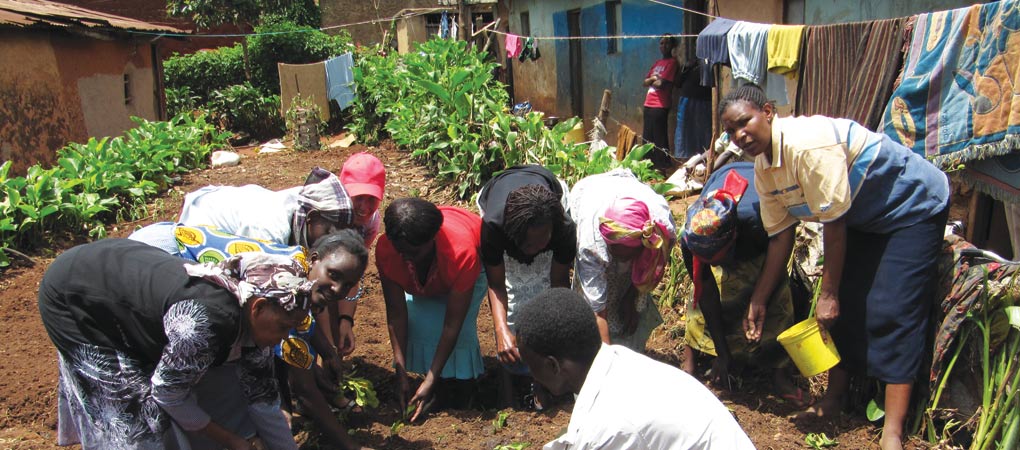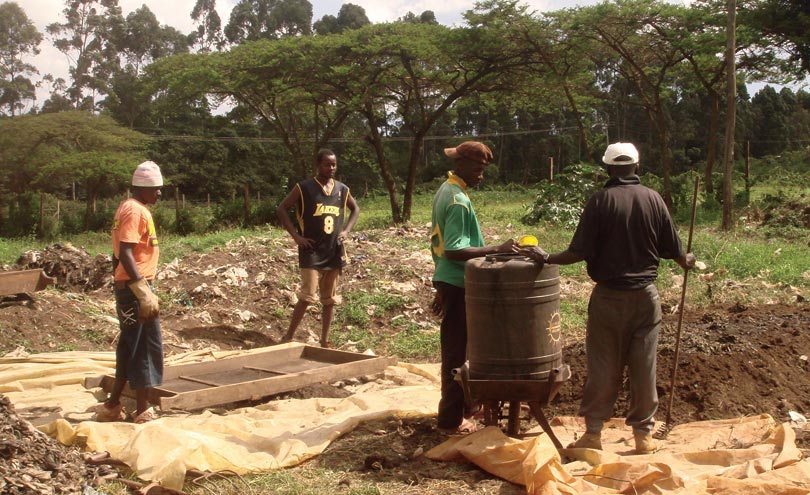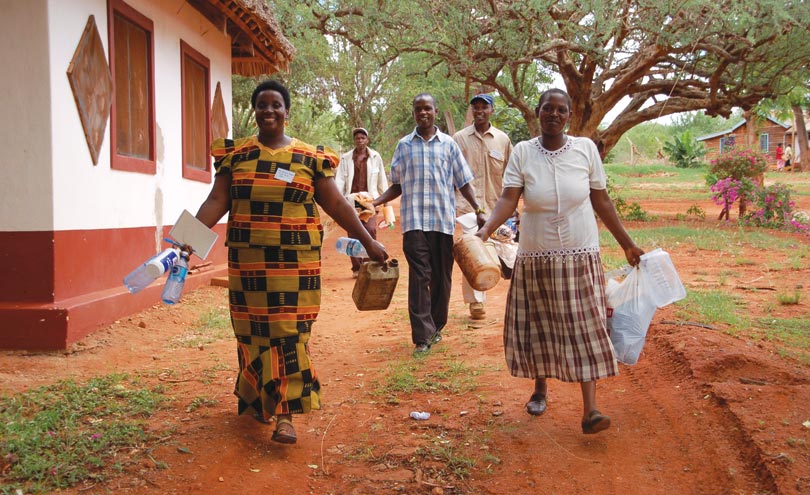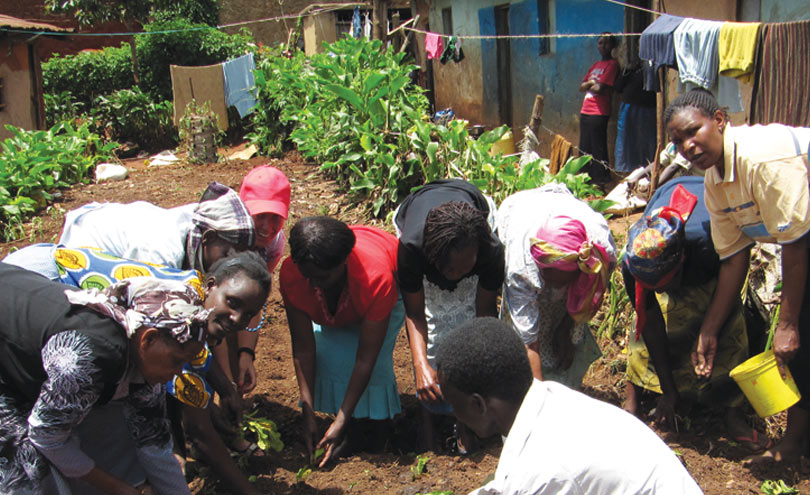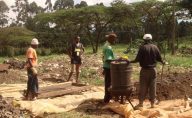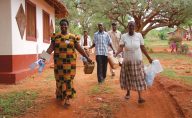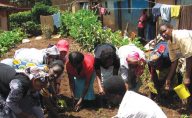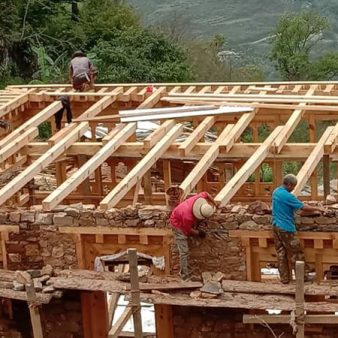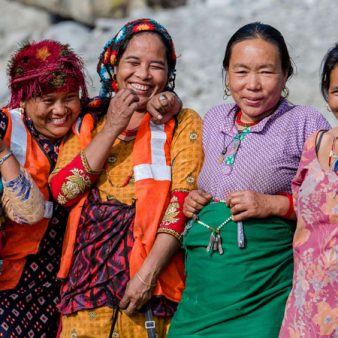Project Description
Aims and Objectives
This project uses community-based waste management and recycling as a strategic entry point to jointly tackle environmental, social and economic challenges in Kitale, as well as in the broader district, province and country. It aims at contributing to a cleaner town and the preservation of the environment in a comprehensive manner, considering socio-cultural aspects.
Context
Kitale is a town of 220,000 inhabitants, capital of the Trans-Nzoia district located in the Rift Valley Province of West Kenya. The economy of the Trans-Nzoia district relies heavily on agriculture and contributes significantly to the national agricultural production and food supply. Kitale is an important market town and commercial hub for the district. Many of its residents are farmers or are involved in subsistence agricultural and horticultural activities. However, livelihood opportunities remain limited, especially for some sectors of the population such as women and young people. This leads to insufficient incomes, inadequate housing conditions, a lack of food security and access to water and energy, and broadened social inequalities.
In addition, vulnerable households suffer directly from the lack of environmental management, which impacts negatively on their health and contributes to further deteriorate their living conditions. Waste accumulation directly contributes to soil, water and air contamination, and the intensive exploitation of the soil and use of chemical products for agricultural purposes exacerbates soil depletion.
Key Features
The Dajopen Waste Management (DWM) group was established as a self-help group by thirty residents (twenty women and ten men, including nine young people) of a slum in the town of Kitale, in 2007. In 2009, it obtained the status of community-based organisation managing a community-based enterprise.
The idea of recycling waste in order to clean the environment and to enhance group members’ livelihood opportunities was brought to the group by one of its members after attending a workshop facilitated by the Ministry of Agriculture and a Kenyan NGO. From then onwards, the DWM group has aimed at improving the economic, social and environmental conditions of the town of Kitale, the DWM group and other communities through a community-based waste management strategy. Its activities have a comprehensive impact on living conditions, with a focus on sustainable livelihoods, cleaner settlements and environment, and community empowerment.
As part of their waste management efforts, DWM members collect waste locally or buy it from street families, in order to produce and sell recycled items. These products include: roofing and floor tiles made out of recycled plastic, baskets, mats and ropes made of plastic bags; jewellery and briquettes made of paper waste; water filters made of saw dust mixed with clay; fencing posts; organic fertilisers, liquid fertilisers and biocides made of bio-degradable waste materials.
The DWM group also focuses on training other community groups, both locally and on a national scale, on how to recycle waste and make recycled products, as well as on organic farming and sustainability. Once trained, they become DWM affiliated groups, and in some cases set up similar enterprises. Training activities include working with students, government bodies and NGOs and training is provided free of charge during agricultural fairs, field days or open learning weeks. Training is also offered via the government’s Kenya Agricultural Productivity Programme in different areas of the country – in this case, the DWM group is paid for its service, as well as with training commissioned by NGOs. The DWM group has also been giving free courses in waste management, organic farming and bio-intensive agriculture to the local youth.
Whilst this project is entirely designed, managed and disseminated by community members, the DWM group has developed partnerships with a wide range of other actors in order to produce, sell and control its products, as well as building the capacity of other groups. Those include community-based organisations and self-help groups, central government agencies, regional and municipal government, academic institutions, and a variety of non-governmental organisations.
What impact has it had?
- Through this project, the 30 members of the DWM group, including women and young people, benefit from enhanced income-generating opportunities and from a cleaner habitat, and are empowered to transform their own living conditions.
- Street families in Kitale have benefitted from collecting and selling paper waste to the DWM group members.
- The DWM approach has an integrated impact on the social, economic and environmental conditions of the affiliated groups to whom the DWM group sells its products and provides training. So far, eight community groups have been trained in producing a range of recycled products. Approximately 3,000 individual farmers have been trained during agricultural fairs and field days or during open learning weeks and a further 18,000 persons (members of 46 farmers’ groups) have been trained via the government Kenya Agricultural Productivity Programme.
- Policy makers, government officials, students and non-governmental institutions with whom the DWM group has collaborated have developed an enhanced awareness of community-led development processes, as well as of environmental, socio-economic and organic farming issues. In addition, the DWM group participates in raising awareness regarding environmental management at the policy level. Together with other stakeholders, it contributed towards discussing and writing a policy proposal which has been submitted to the government.
- The DWM group has set a precedent in community-led environmental management, contributing to a cleaner town and to the preservation of the broader environment.
How is it funded?
The initial costs of US$1,012 were covered with the members’ registration fee of US$6 plus additional members’ contributions, and have been used for rent, transport and buying materials. In addition, each member pays for his/her own protective clothing and each year there is a renewal fee of US$2.43 per member to cover administrative costs.
In order to cover the running costs of the project, each member contributes with 30 per cent of their sales to the group’s coffer, and retains the remaining 70 per cent. At the end of the year, approximately 20 per cent of this collective fund is distributed amongst members, and 80 per cent is reinvested into the project (according to the members’ decision). A one-off loan of US$1,218 was taken with a private bank to cover the costs of organic fertiliser and has since been repaid.
Why is it innovative?
- The DWM project is both production-orientated and service-orientated (regarding the training component).
- It develops, produces and promotes innovative, affordable and sustainable products that improve vulnerable populations’ living conditions in an integrated manner.
- It seeks to tackle environmental problems and urban waste problems considering the socio-economic issues of the community.
- This entrepreneurial project is entirely community-initiated and community-driven, including the scaling up and transfer strategies.
What is the environmental impact?
As a waste management and recycling initiative, the DWM project relies entirely on the re-use of locally available materials. It has directly contributed to changing vulnerable community members’ behaviours regarding waste management and fostered sustainable lifestyles. Since it was first initiated, 95 per cent of the members have changed their waste disposal method.
The project encompasses the production and sale of briquettes, which represent a cheaper and readily available fuel that can be used for cooking and domestic heating and which contribute to reducing fuel poverty. The DWM furthermore produces and teaches others how to produce water filters, improving the quality of and access to water supply. Its collaborative efforts with government actors, other community groups and students have helped to facilitate the mainstreaming of environmental management approaches.
The DWM approach also works to achieve a wider environmental impact, as collecting and recycling waste leads to a significant decrease in air, soil and water stream contamination, as well as to the preservation of the local fauna and flora. In addition, the use of recycled construction items and alternative energy sources contributes to decreasing deforestation rates, whilst the dissemination of organic farming methods counters the degradation of agricultural soils on a country-wide scale.
Is it financially sustainable?
The project has been self-sustaining for the past four years, relying initially on members’ contributions and later on the income generated by the sale of products, as well as funds received for the training commissioned by the Kenyan government. In order to further scale up its work, the DWM group is currently looking into additional sources of funding and potential donors.
The project develops and promotes sustainable income-generating opportunities through waste recycling for vulnerable community groups as well as generating a new source of income for street families involved in the collection and sale of urban waste. In addition, farmers’ livelihoods are supported through the provision of organic fertilisers and training in organic farming methods.
Indirectly, the project allows community members to save money by improving their access to inexpensive, locally sourced products and resources, including energy (fuel, water) and building materials (recycled roofing and floor tiles).
What is the social impact?
This project contributes to an improvement in the health conditions of community members as a result of the reduction in the presence of vermin, the contamination of soils, water streams and air, and flooding and fire hazards. The project also includes the production of mosquito repellent and recycled water filters.
The project relies on DWM group members’ self-organisation and cooperation, and on their providing support to other community groups. It therefore increases vulnerable community members’ productive skills, encourages collective productivity and acts as a catalyst for greater community cooperation, whilst allowing vulnerable community members to contribute positively to the broader environment, economy and society.
The project enhances the social, economic and environmental conditions of vulnerable groups – including women (who undertake 80 per cent of the work) and young people, street families and small-scale farmers – thereby helping to reduce social inequalities.
The collaboration between community members and institutional actors represents a positive shift in broader governance processes in Kenya, whereby communities are involved as active citizens and are recognised as holding valuable knowledge and experiences.
Barriers
- At first, the project encountered resistance from the local community and local authorities who were wary of making products out of waste materials. Workshops were organised in order to raise stakeholders’ awareness of the safety of recycling activities and recycled products. The DWM group also organised public awareness campaigns about waste management in order to raise the interest of the broader community.
- Funding has been and remains a key challenge, despite the relative sustainability that the project has achieved.
- The lack of a strong dissemination and marketing strategy for its products has hindered the further scaling up of the DWM approach, and the group is currently looking at developing this aspect of its work.
Lessons Learned
- Waste materials represent readily available resources which local communities and farmers can productively tap into. Their recycling contributes to improving vulnerable communities’ conditions in a comprehensive manner, enabling them to jointly address environmental, economic and social issues.
- Waste management is an activity that can be replicated in most locations.
- Seeking financial self-sustainability and relying on local resources, as well as developing strategic partnerships with a wide range of actors, are key elements to the success of this project.
- With proper support from other actors, it is possible to scale up and facilitate transfer through community-based strategies.
Evaluation
Whilst no comprehensive formal assessment has been conducted so far, the positive impact of the DWM’s activities on members’ living conditions has been observed. In addition, the DWM group controls the quality of its products in partnership with a variety of research and academic institutions.
Transfer
There has been a significant increase in the sales of DWM products over the past years; for example, sales of organic fertiliser increased from 320 bags in 2009 to 1,490 in 2010.
The DWM group has provided training services to other self-help groups in and around Kitale, in the broader Trans Nzoia district and the broader Rift Valley province (West Pokot, UasinGishu), as well as in other provinces across the country (Nyanza province, Coast province, Central and Western provinces). Some of the groups trained have set up similar enterprises locally and nationally, e.g. the Tuwan Slums Environmental Women Group in Kitale.
The DWM project has hosted Kenyan students as well as students from American and Mozambican academic institutions as interns and volunteers, contributing towards the dissemination of the approach.
The project has been visited by municipal officials from Uganda (Mbale and Sironko), which have subsequently set up similar initiatives in their localities (briquette-making in Sironko; production of organic fertiliser in Mbale), as well as by delegations from Madagascar, DRC and Ethiopia.

